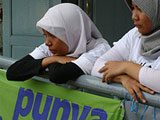US Muslims Under Microscope
By Peter A Buxbaum for ISN
The Muslim community in the US is concerned, and rightly so, about the perception that it is a breeding ground for home-grown terrorists.
Just last week, the Washington Post external pagereported the storycall_made of a US-born Virginia resident and convert to Islam who was arrested in New York as he attempted to leave the country for Somalia to join the al-Qaida affiliated al-Shabbab group.
There are several other prominent examples of US Muslims adopting radical ideologies and perpetrating acts of violence. US Army Major Nidal Hasan, born in the US of Palestinian parentage, is accused in the November 2009 shootings in Fort Hood, Texas, in which 13 US military personnel were killed. More recently, Faisal Shahzad, a naturalized US citizen born in Pakistan, pleaded guilty to planting a bomb in Times Square. Both Hasan and Shahzad were apparently in touch with and influenced by the radical Yemen-based American cleric Anwar al-Awlaki.
On the other hand, it was Aliou Nasse, a Senegalese Muslim immigrant, who alerted New York police to a suspicious SUV parked near Times Square, which turned out to be Shahzad's.
All this points to a multifaceted situation, in which the mainstream US Muslim community is attempting to integrate itself into US society while a small, "but not insignificant" number, in the words of a January 2010 study funded by the US Department of Justice, are becoming radicalized and turning to violence. Worse yet for US Muslims is the perception that many of them are in league with enemies of the US, which has led, among other things, to tense relations with law enforcement agencies.
US Muslim leaders admit that increasing numbers of their community had been mobilized to violence in recent years. Muslim violent extremists "pose a serious challenge to American security," according to a external pagepaper publishedcall_made recently by the Muslim Public Affairs Council (MPAC), a US advocacy group.
The Justice Department study found that "139 Muslim-Americans committed acts of terrorism-related violence or were prosecuted for terrorism-related offenses that involve some element of violence" since 2001. "This level of approximately 17 individuals per years is small compared to other violent crime in America," the study concluded. "Homegrown terrorism is a serious, but limited, problem."
Self-policing and ‘lazy’ racial profiling
Aliou Nasse’s story should serve as a model for the role Muslims in America can play in fighting domestic violent extremism, said Keith Ellison, a Democrat from Minnesota and the first and only Muslim member of the US Congress, in a recent Washington speech.
In fact, self-policing and cooperation with the authorities have become the watchwords of the US Muslim community, according to both the Justice and MPAC reports.
"Muslim-Americans have adopted numerous internal self-policing practices to prevent the growth of radical ideology in their communities," said the DOJ report. "The practices range from confronting individuals who express radical ideology or support for terrorism, preventing extremist ideologues from preaching in mosques, communicating concerns about radical individuals to law enforcement officials, and purging radical extremists from membership in local mosques."
The MPAC paper concluded that there have been 11 "post-9/11 al-Qaeda-related plots foiled with the assistance of Muslim communities. This is nearly one-third of all such plots that threatened the United States."
US Muslims "came forward because they trusted the government enough with this information, not because they feared the government," said Ellison.
But he added that too often law enforcement agencies rely on "lazy" racial profiling techniques which erode both civil liberties and "the necessary trust" for Muslims to continue to cooperate. “Behavior, not demographic characteristics, should be our guiding light,” said Ellison. At the same time, the Muslim community itself needs to combat domestic extremists with its own "better, truer message."
Ellison advocated building partnerships between law enforcement agencies and communities as "essential to preventing attacks," a view echoed by William Bratton, the former chief of both the New York and Los Angeles police departments who now heads a security consultancy.
Police departments in big US cities have adopted a technique called "community policing" in recent years, Bratton told ISN Security Watch, in an effort to prevent crime. The strategy has paid dividends, especially in Los Angeles with efforts to curb gang violence.
The premise behind community policing is that "police can't do it alone," said Bratton. "To defeat terror we need increased partnerships between communities and law enforcement agencies and local police are integral to the effort. We need to understand that hometown security is an essential component of homeland security."
Increasing bias
For all of the good intentions of police departments, and the documented cooperation from among Muslim Americans, the community has felt, according to the Justice report, a stronger anti-Muslim bias from American society and officialdom since 9/11, leading to "increased tension...about their acceptance in mainstream American society."
"While Muslim-Americans understand and support the need for enhanced security and counterterrorism initiatives," the report said, "they believe that some of these efforts are discriminatory, and they are angered that innocent Muslim-Americans bear the brunt of the impact of these policies."
In fact, community policing feels like community monitoring to many US Muslims, according to Nadia Roumani, director of the American Muslim Civic Leadership Institute. The task should be to "build an infrastructure in the community to deal with crises and to engage young people for the longer term," she told ISN Security Watch. "That has been missing."
Instead, Roumani said, "The emphasis has been on information gathering and not information sharing. There is also the idea that the community needs to be monitored and that presumes every Muslim is a potential terrorist. That is not the way the community sees itself."

